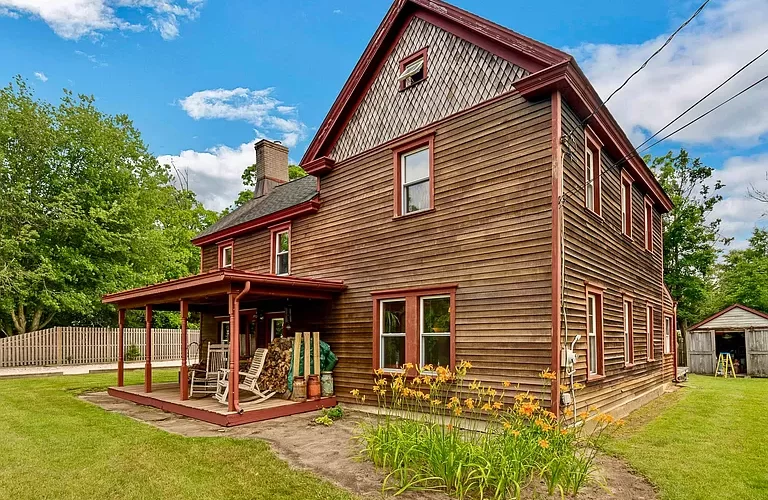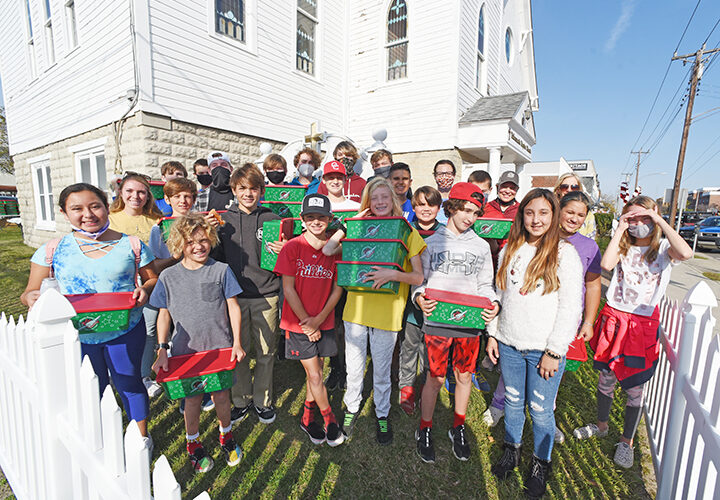Land, historic home abut Marshallville Road Bridge
“This is an amazing opportunity for the county and township to respond to the reasonable and acceptable pressure from those individuals seeking safe, legal and authorized amenities for water access,” Marshallville Road resident Mark Kelly states in an application to the county Open Space Board.
Kelly told Township Committee of his intentions during a meeting Dec. 11, saying he thinks his property, which is listed with the Multiple Listings Services for $349,000, could be used to provide public water access and a safe place for emergency vehicles to turn around at the dead end.
The property is contiguous with the Marshallville Road Bridge, which the county is in the process of replacing. The state Historic Preservation Office (HPO) discussed the county’s plan to replace the bridge during a meeting in April.
Upper Township’s former engineer Paul Dietrich said at the time that local residents had requested the county reopen the bridge to pedestrians and bicyclists.
According to a document from the HPO, the county proposes to replace the 1901 bridge over Mill Creek with a Warren truss pedestrian bridge.
The HPO is involved because while the bridge has been altered, the area has been listed on the New Jersey Register of Historic Places. Marshallville was a glassmaking center in southern New Jersey and Marshallville Road served as the village’s main street.
According to the document, there was a single-lane covered bridge over Mill Creek in 1841 with stone masonry abutments. The covered bridge was replaced with a Warren Pony truss in 1901 and is a contributing resource to the Marshallville Historic District, which was added to the National Register of Historic Places in 1989.
The 1901 Warren Pony truss is not eligible for listing because some of the superstructure steel stringers were supplemented with wooden stringers in the 1990s.
At present, the document states, steel floor beams have severe rust, steel bearings exhibit moderate to heavy corrosion and 100 percent section loss in the steel stringers, which are not salvageable.
“The superstructure is substantially deteriorated and has been closed to vehicular traffic since 2004 and, thus, rehabilitation and preservation of the Warren Pony truss bridge (1901) is not prudent or feasible,” the document states.
The county plans to remove the superstructure and replace the bridge, which would result in the total loss of a historic district contributing resource.
However, the HPO noted, the replacement would result in a modern bridge that would match the historic bridge in design, materials and color complementary to the setting.
The county’s design would increase the bridge elevation to provide at least 5 feet of clearance for boat traffic. The 10-foot-wide pathway would comply with Americans with Disabilities Act standards.
“It would be a fabulous 1.2 acres to complement the bridge, provide a small boat ramp and turnaround for emergency vehicles,” Kelly said.
Kelly filed an application with the county for Open Space Land Acquisition on Dec. 8. The application states the property is in marketable condition “with offers coming in at $300,000” and notes a septic system was recently installed.
“Improvements to the property can align seamlessly with the county-proposed pedestrian bridge,” the application states.
In the application, Kelly argues that the county and township are obligated to provide amenities for residents.
“As a property owner, I have witnessed and heard reasonable expressions of the need for access to Mill Creek from the Marshallville Road Bridge area. Campers from area campgrounds have launched kayaks, canoes and other small vessels, such as duck boats, from the Marshallville bridge for the past 23 years,” he states.
Kelly argues that county acquisition of the land would provide a an “immediate benefit to the neighborhood” by facilitating development of a boat ramp.
“The township would benefit as our parcel could provide parking, restrooms, playgrounds, small sand sitting beach (like neighboring Corbin City) for those not living in the immediate neighborhood,” Kelly states in the application.
He states the acquisition also would fulfill the need for a cul-de-sac so emergency vehicles can properly turn around.
“The cul-de-sac can be incorporated with the bridge project and boat ramp. This will also umbilically link the other county cul-de-sac at the opposite side of Marshallville Road near the railroad tracks,” Kelly states. “With the linking of these two cul-de-sacs, the county and township can work together on an agreeable curb and sidewalk program for the safety of neighborhood children walking to and from bus stops.”
He further states that roadway improvements would improve drainage and prevent runoff.
“Curbs will ultimately help the county and township comply with the New Jersey Pollutant Discharge Elimination System (NJPDES). In its current proposed condition, the bridge project does not appear to address drainage or elevation,” the application states.
Kelly also argues the home on the property could provide a place for tours and other uses, such as a museum for the Historic Preservation Society of Upper Township.
“The structure on the site was built circa 1840 and blends seamlessly as fas as aesthetics are concerned with the neighborhood. Environmentally, a school and county 4-H program could come and explore the historic home. The property could easily become a smaller version or annex of The Wetlands Institute,” he states. “Historically, the home on the site mirrors the Gandy House in Upper Township, the Tuckahoe Train Station and a host of other well-kept historic attractions in our county.”
The application states the property includes more than 300 feet of Mill Creek waterfront that is contiguous to the bridge project area and more than 400 feet along Marshallville Road.
“Accessibility would be convenient along the county road to the site. With county and township planning, this can be a site accessible by all. The site is close to the population center of Tuckahoe. A New Jersey Transit bus stop is available along Route 50 in Tuckahoe. You can walk or ride a bike to the parcel,” the application states. “Preservation of this site, with proper planning, would absolutely create a safe, viable community asset that could be lost if a private sale were to occur.”
Reached later in the week, Mayor Jay Newman said it was premature to comment, noting it was the first he had heard of the idea and that the Open Space Board would have to accept the proposal before any steps could be taken to bring it to fruition.
Deputy Mayor Kim Hayes, who oversees recreation for the township, said the priority is getting the bridge replaced and open, noting the project is set to go out for bids in the first quarter of the year and completion is scheduled for the spring.
“We need to focus on getting that bridge fixed and reopened to traffic — it’s a quiet street that has been cut in half — after that we can look at what expansion may make sense there,” Hayes said.
By CRAIG D. SCHENCK/Sentinel



